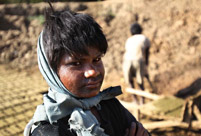Joseph Estrada, Mayor of Manila and former president of the Philippines, tried to pick up where President Benigno Aquino III failed three years ago. An overdue apology from the city of Manila was reportedly delivered to Hong Kong yesterday for the bus bloodbath in 2010 in which 22 Hong Kong tourists were held hostage and eight were brutally slain.
Manila-based media TV5 reported that the city "passed a resolution taking it on the city government to apologize directly to the people of Hong Kong." According to a report by the South China Morning Post, the mayor himself will likely reiterate his apology during a trip to Hong Kong next month.
The tragedy, without an appropriate settlement since, had never faded away in the minds of Chinese. During the period of ASEAN and APEC meetings, both Chinese Premier Li Keqiang and Hong Kong Chief Executive Leung Chun-ying urged the Philippines to take substantial measures to address the incident.
Calling for an official apology from the Philippine government has been one of the major claims that the victims' families are demanding. But President Aquino has insisted on not apologizing on behalf of his government.
Estrada's apology appears to be a step forward. But the so-called progress does not seem to be made on the basis of self-introspection and sincerity.
The 2010 massacre was a ghastly display to the world of the vast clumsiness and incompetence of the country's crisis response mechanism.
The mismanagement of the crisis started from the top leadership. By depending on a group of ill-trained special forces, some ill-prepared local commanders and an ill-thought-out plan, the Philippine government showed nothing but ineptitude in handling the situation.
Therefore, an apology on behalf of the city of Manila, where the crisis happened, instead of the national government, is far from enough.
Estrada's apology should be regarded as the result of a compromise made by the Philippine government in the face of China's growing influence in the region and the pressure to improve relations with China.
Aquino's reiteration of not apologizing a couple of days before Estrada decided to say sorry - an interesting contrast - demonstrates that the apology is more like an attempt to build rapprochement with China without losing too much face.
But if the Philippine government keeps refusing to face up to its misdeeds and assume its responsibilities, its tricky diplomacy will probably backfire.
 Low wages Indian migrant laborers
Low wages Indian migrant laborers Five fighters in flight training
Five fighters in flight training London mayor hails free trade, subway system on China tour
London mayor hails free trade, subway system on China tour Different eye catching shows at housing fairs in China
Different eye catching shows at housing fairs in China Special family portraits call attention to left-behind children
Special family portraits call attention to left-behind children Tibetan girl helps mobilize volunteers onlin
Tibetan girl helps mobilize volunteers onlin Lingerie show dazzles Wuhan Motor Show 2013
Lingerie show dazzles Wuhan Motor Show 2013  Running in fun customs at Beijing Int'l Marathon
Running in fun customs at Beijing Int'l Marathon  Weekly Sports Photos
Weekly Sports Photos Chinese riot police take Liberia peacekeeping mission
Chinese riot police take Liberia peacekeeping mission World has never been dark-- a blind kid’s life in Tibet
World has never been dark-- a blind kid’s life in Tibet Change to law may make it easier to sue polluters
Change to law may make it easier to sue polluters UNESCO world heritage site: Montale Tower
UNESCO world heritage site: Montale Tower U.S. Senate leader announces bipartisan deal
U.S. Senate leader announces bipartisan deal Chinese screen goddesses from Beijing Film Academy
Chinese screen goddesses from Beijing Film Academy Day|Week|Month